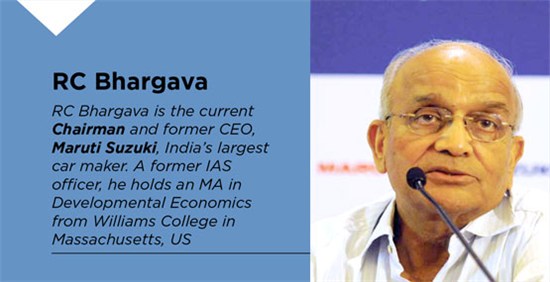
Indians today are full of hope for the future. That is the result of our electing a leader who is trusted, and in whom there is confidence that he will bring big changes. But the process of realising our hopes is not easy. It will require all of us to realise what we need to do and how we need to change, if our hopes are to become reality.
We need to understand that improvements and changes will not happen if we merely live off on the successes that we have had in the past. Certainly, successes have come our way in many areas, however it would be difficult to say that we have achieved as much as we could have or need to have. It is necessary to introspect and identify areas where we have potential to succeed, either as an individual or as an institution or as a country. Mistakes and experience are the best teachers in life, provided we are ready to learn from them. We then should analyse and identify the root causes of those failures and find the right course corrections for the future. We must resist the temptation to blame others and 16 The Finapolis l February 2015 consider what we could have done ourselves to have performed better.
When we attained Independence 67 years ago, the people of India had complete faith and trust in our political leadership. Over the years, this trust has eroded and hardly any politician is really respected at large today for what he or she is as a person. Respect is paid to the chair that a person sits on, not to the person. The Civil Services commanded great respect for many years because of their competence, integrity and fairness. There has been a severe degradation of these virtues. Most business leaders too have, over the years, ceased to be looked upon as persons who can be trusted and respected. The public and the media, and often for valid reasons, don’t trust politicians, bureaucrats or businessmen. The political establishment believes that it cannot be seen to be helping industry and business grow and become more profitable. Our laws, processes and systems of implementing policies and projects are based on this distrust, and lead to delays and poor implementation. There is a huge gap between what is supposed to be done and what happens on the ground. The end result of this situation is that the common man has to bear the burden of high cost and inefficiently provided goods and services, including public services. If we are to realise our new hopes and dreams, all of us, especially those in politics, civil services and also the judiciary and business activities, need to build trust in each other and work in a manner that the trust gets stronger over time.
I believe that India has the potential to become the most competitive place to do business, if all our systems are based on trust, and that trust is respected through effective laws and their implementation
Many things have to change. The most important is perhaps the way the political processes of our democracy are funded. Transparency in that area would help to remove one of the main reasons requiring generation of black money, leading to crony capitalism, distrust of businessmen and widespread corruption. The processes need to be changed so that market forces can operate rather than administrative discretion. The tax administration, while implementing the law and collecting taxes, should function in a manner that helps to create trust by curbing tax evasion at all levels.
 Along with these changes, the machinery for implementing laws has to become effective. It must be seen to be transparent, not weighted in favour of the rich and powerful. Wrongdoers who violate economic laws or commit crimes, whether serious ones under the IPC or even simple traffic offences, should not get away by use of money power or position. The investigative arms of the Government must be equipped to use technology to complete the work competently. The court processes have to finish much faster. There must be fear of quick and certain retribution if trust is to be created and respect for the law restored.
Along with these changes, the machinery for implementing laws has to become effective. It must be seen to be transparent, not weighted in favour of the rich and powerful. Wrongdoers who violate economic laws or commit crimes, whether serious ones under the IPC or even simple traffic offences, should not get away by use of money power or position. The investigative arms of the Government must be equipped to use technology to complete the work competently. The court processes have to finish much faster. There must be fear of quick and certain retribution if trust is to be created and respect for the law restored.
Apart from greater respect for law, the processes for better education and information to citizens about matters such as safe driving, cleanliness, littering and public health must be instilled school level up. The level of discipline in the country has to increase if we are to become a modern developed country. Meanwhile, importance of respecting legitimate rights of others has to be inculcated as progress requires teamwork.
India has the potential to become the most competitive place to do business if all our systems are based on trust, and that is respected through effective laws and their implementation. Subsidies are not the way to promote manufacturing competitiveness. Teamwork between management and workers can add to building long-term competitiveness. Better skill development programmes are required. Non value adding processes and requirements need to be eliminated. Reducing cost of doing business through constant improvement in processes and systems is what is required to build India of our dreams.
Written By: RC Bhargava is the current Chairman and former CEO, Maruti Suzuki, India’s largest car maker. A former IAS officer, he holds an MA in Developmental Economics from Williams College in Massachusetts, US